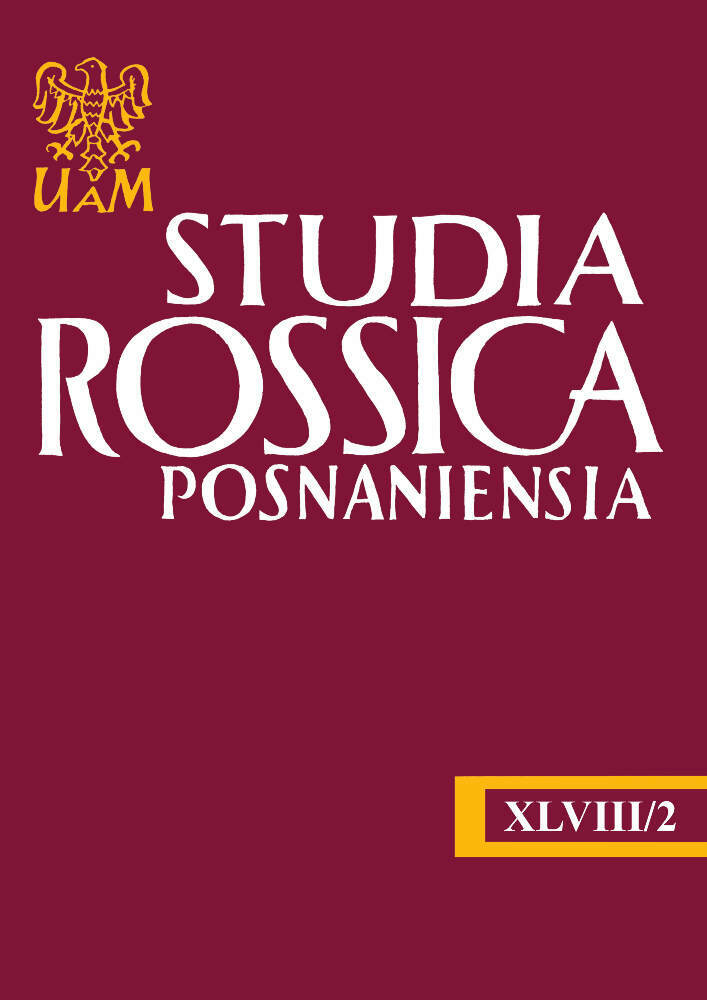Abstract
The subject of the analysis is the short story by Anna Starobiniec titled The alive (2005). By using, inter alia, anti-utopia elements, the author analyzes the contemporary problems of mankind, presenting them against the backdrop of the world after “the end of history”, in which the catastrophe opens a completely new chapter in the history of Russia. The main characters are a pair of humanoids living in the posthuman world who are desperately trying to validate their human identity. In terms of the ideological aspect of the work, this raises the need to reformulate the thesis about the essence of humanity and the question about the criterion of the role and place of man in the world. If we assume that what people hope for defines their place in reality, then how to position the robot that hopes to become human? This problem (in the light of scientific progress) is only apparently distant and exotic, and in fact closer than we all think (especially in the moral and ethical dimension). In this context, it can be said that the story by Starobiniec is an important voice in the discussion on the problems of the future of the modern world in relation to the postulates of transhumanism – that considers and even allows for the abandonment of the human in favor of various variants of the posthuman.
References
Anna Starobinec: „Pišut, čto dali premiû za to, čto Rossiû nenavižu”. Intervʹû Svetlany Rejter. 26.07.2018. Web. 01.09.2021. https://www.bbc.com/russian/features-44964400.
Bakke, Monika. „Galatea i androidy”. Antropologia ciała. Zagadnienia i wybór tekstów. Red. Małgorzata Szpakowska. Warszawa, Wydawnictwo Uniwersytetu Warszawskiego, 2008, s. 273–281.
Beck, Ulrich, Anthony Giddens, Scott Lash. Modernizacja refleksyjna. Polityka, tradycja i estetyka w porządku społecznym nowoczesności. Przeł. Jacek Konieczny. Warszawa, PWN, 2009.
Gajewska, Grażyna. Arcy-nie-ludzkie. Przez science fiction do antropologii cyborgów. Poznań, Wydawnictwo Naukowe UAM, 2010.
Gąska, Paweł. „Historia rozwoju konwencji postapokaliptycznej jako odbicie lęków kultury zachodniej”. Annales Universitatis Mariae Curie-Sklodowska. Sectio FF – Philologia, 2 (34), 2016, s. 13–32. DOI: https://doi.org/10.17951/ff.2016.34.2.13
Kulińska, Lucyna. „Bieda w czasach globalnej obfitości”. Globalopolis. Kosmiczna wioska. Szanse i zagrożenia. Red. Robert Borkowski. Warszawa, Instytut Wydawniczy Pax, 2003, s. 146–167.
Kulińska, Lucyna. Bieda w dobie globalizacji. Web. 31.08.2021. http://www.biuletyn.agh.edu.pl/archiwum_bip/_2001/_87/18_87.html.
Łukaszewski, Wiesław. Szanse rozwoju osobowości. Warszawa, Książka i Wiedza, 1984.
Muniak, Radosław Filip. Personages, czyli antropomorfizacja przedmiotu. Web. 31.08.2021. https://www.nck.pl/upload/archiwum_kw_files/artykuly/11._radoslaw_filip_muniak_-_personages_czyli_antropomorfizacja_przedmiotu.pdf.
Nijakowski, Lech M. Świat po apokalipsie. Społeczeństwo w świetle postapokaliptycznych tekstów kultury popularnej. Warszawa, Wydawnictwo Naukowe Scholar, 2018.
Radkowska-Walkowicz, Magdalena. „Sztuczne dziecko. Między niepokojącą obcością a swojską czułością”. Przegląd Filozoficzny – Nowa Seria, 18 (3), 2009, s. 307–317.
Robot-diktor novostej i drugie androidy iz Âponii. Web 31.08.2021. http://edurobots.ru/2014/06/robot-diktor-novostej-i-drugie-androidy-iz-yaponii/.
Starobinec, Anna. Živye. Web. 31.08.2021. https://topreading.ru/bookread/78271-anna-starobineczhivye.
Szymański, Kamil. „Transhumanizm”. Kultura i Wartości, 13, 2015, s. 133–152. DOI: https://doi.org/10.17951/kw.2015.13.133
Wojciechowski, Piotr. „Geneza zjawiska sztucznych ludzi w kulturze”. Kultura Popularna, 2 (36), 2013, s. 95–111. DOI: https://doi.org/10.5604/16448340.1081210
Zaslavskaâ, Tatʹâna. Socialʹnaâ struktura sovremennogo rossijskogo obŝestva. Web. 31.08.2021. https://cyberleninka.ru/article/n/sotsialnaya-struktura-sovremennogo-rossiyskogo-obschestvav-rabotah-t-i-zaslavskoy/viewer.
Žižek, Slavoj. Patrząc z ukosa. Do Lacana przez kulturę popularną. Przeł. Janusz Margański. Warszawa, Aletheia, 2018.
License
Copyright (c) 2023 Aleksandra Zywert

This work is licensed under a Creative Commons Attribution-NonCommercial-ShareAlike 4.0 International License.

